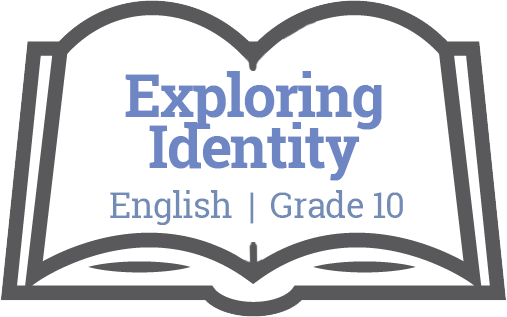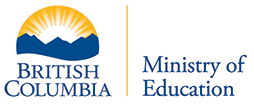
Unit Plan: Exploring Identity
English Language Arts / Grade 10

Big Ideas
The exploration of text and story deepens understanding of one’s identity, others, and the world.
Concepts:
- Identity
- Nature vs. Nurture
- Perspective/Voice in texts
Essential Questions
Students will keep considering…
- Who am I? How do I define myself ? How does my identity change and evolve?
- How does making connections between text and self deepen my understanding of my own identity?
- How does understanding my own identity help me to connect and empathize with others?
Evaluative Criteria
TEACHER EVALUATIVE CRITERIA
Criteria
Formative assessment:
Observation in class, participation in activities for each short story, completion of skill/knowledge components
Formative tasks:
- Box of Self
- Elements of Short Stories: completion of charts for all stories
- Reflective writing tasks based on three of the short stories
- Character monologue
- Self, peer and teacher feedback and reflection—ongoing throughout the unit
- Checkpoint quizzes
Summative assessment:
Personal Profile Performance Task
Rubric:
See attached Personal Profile rubric (DOWNLOAD)
Adaptations:
- Read aloud of all short stories: focus on the understanding of identity, not individual reading and decoding skills.
- Refer to NVSD Adaptations Checklist for further support
- Work with Learning Services staff to support with adaptations for students with IEPs
Differentiation:
- Requirements of the performance task product can be differentiated based on learning styles and needs
- Student choice in texts/sources: poetry, short stories, novels, web articles, non-fiction, movies, songs, documentaries, TV shows etc.
- Student choice in the presentation of the Personal Profile: blog, website, Prezi, PowerPoint, Show Me, Vlog etc.
Extension:
Students can add other components to the personal profile that include connection to the similar Big Ideas in other curricular areas
Monitoring Progress
Teacher will monitor progress:
Criteria:
Use techniques to check for understanding: exit tickets, quizzes, student interviews, observation, mini group presentations etc.
Differentiation:
- Allow students to select their own short stories for discussion, use videos or Totals around the identity theme, read aloud of text, partner activities as needed, use LAC teacher to support differentiation
- Lesson activities can be differentiated based on learning styles and student needs
Resources
Suggested Short Stories
Wild Horses by Brian Fawcett, The Persian Carpet by Hanan Shaykh, Legend of the Sugar Girl by Joseph Boyden, On the Sidewalk, Bleeding by Evan Hunter, Just Lather, That’s All by Hernando Telles
See also:
Reflection
How will teachers and their students reflect on and evaluate the completed project?
Constant feedback from students and dialogue after each activity outlined in the Learning Events will help to direct and adapt what is explored in the next activity. Self, peer and teacher evaluation of the Performance Task and its alignment with the essential questions.
Teacher:
Next time I teach this unit I would…
Allow students to select the short stories that link to Identity.
Student:
My students needed:
Process:
Product:
Content:
Potential Student Misunderstanding:
Stage 1 – Desired Results
Big Ideas
The exploration of text and story deepens understanding of one’s identity, others, and the world.
Concepts:
- Identity
- Nature vs. Nurture
- Perspective/Voice in texts
Transfer Goals
Students will be able to independently use their learning to…
- Strengthen their understanding of themselves, diverse cultures, and multiple perspectives through the exploration of texts.
- Think creatively, critically, and reflectively about language and texts as part of constructing and communicating personal meaning
Meaning
Students will understand that…
1. Our identity is shaped by many factors.
Life experiences, beliefs, religion, family traditions, culture, etc. define who we are and can effect how we interact with and enjoy texts.
2. Authors use texts to express and highlight their own personal experiences, beliefs and identity.
Learning about other peoples, cultures and perspectives through stories impacts our understanding of our self and our own beliefs.
Students will keep considering…
- Who am I? How do I define myself? How does my identity change and evolve?
- How does making connections between text and self deepen my understanding of my own identity
- How does understanding my own identity help me to connect and empathize with others?
Acquisition
Students will be skilled at…
Comprehend and Connect:
- applying appropriate strategies in a variety of contexts to comprehend texts, guide inquiry, and extend thinking
- thinking critically, creatively and reflectively to explore ideas within, between and beyond texts
- recognizing and identifying the role of personal, social, and cultural contexts, values, and perspectives in texts
- constructing meaningful personal connections between self, text and world
Create and Communicate:
- using the writing and design process to plan, develop and create engaging and meaningful literary, imaginative, and informational texts for a variety of purposes and audiences
- assessing and refining texts to improve their clarity, effectiveness, and impact according to purpose, audience and message
- using the conventions of Canadian spelling, grammar, and punctuation proficiently and as appropriate to the context
CONTENT
Students will know that…
Story/Text:
- Persuasive techniques
- Literal and inferential meaning
- Features and structures of narrative
- Elements of short stories
Strategies and Processes:
- reading strategies
- oral language strategies
- metacognitive strategies
- writing processes
Language features/structures/conventions:
- syntax and sentence fluency conventions
Which Core Competencies will be integrated into the unit?
Communication: oral, written and visual
Critical and Creative Thinking: perspective, point of view, connecting self to text
Personal and Social: metacognition, empathy, cultural awareness
First People's Principles of Learning
The unit will make connections with:
Learning requires the exploration of one’s identity (Principle #8)

The following resources are made available through the British Columbia Ministry of Education. For more information, please visit BC’s New Curriculum.
Big Ideas
The Big Ideas consist of generalizations and principles and the key concepts important in an area of learning. The Big Ideas represent what students will understand at the completion of the curriculum for their grade. They are intended to endure beyond a single grade and contribute to future understanding.
Core Competencies
 Communications Competency
Communications Competency
The set of abilities that students use to impart and exchange information, experiences and ideas, to explore the world around them, and to understand and effectively engage in the use of digital media
 Thinking Competency
Thinking Competency
The knowledge, skills and processes we associate with intellectual development
 Social Competency
Social Competency
The set of abilities that relate to students’ identity in the world, both as individuals and as members of their community and society
Curricular Competencies & Content
Curricular Competencies are the skills, strategies, and processes that students develop over time. They reflect the “Do” in the Know-Do-Understand model of curriculum. The Curricular Competencies are built on the thinking, communicating, and personal and social competencies relevant to disciplines that make up an area of learning.
Additional Resources
First People's Principles of Learning
To read more about First People’s Principles of Learning, please click here.
For classroom resources, please visit the First Nations Education Steering Committee.
